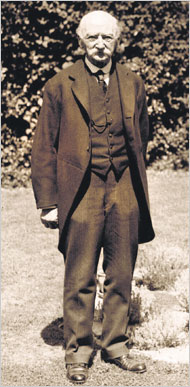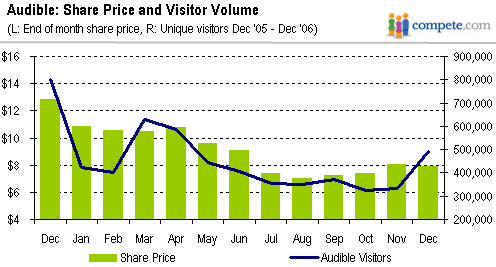February 20th, 2007 at 10:55 am (In the News, Libraries)
Will Sherman writes at DegreeTutor.com that librarians are not obsolete. In fact, he offers a list of 33 reasons that libraries and librarians are still extremely important.
Many predict that the digital age will wipe public bookshelves clean, and permanently end the centuries-old era of libraries. Technology’s baffling prowess and progress even has one librarian predicting the institution’s demise. He could be right.
But if he is, then the loss will be irreplaceable. As libraries’ relevance comes into question, they face an existential crisis at a time they are perhaps needed the most. Despite their perceived obsoleteness in the digital age both libraries — and librarians — are irreplaceable for many reasons. 33, in fact. We’ve listed them here.
The list — minus Sherman’s elaboration on each point — is as follows:
- Not everything is available on the internet.
- Digital libraries are not the internet.
- The internet isn’t free.
- The internet complements libraries, but it doesn’t replace them.
- School libraries and librarians improve student test scores.
- Digitization doesn’t mean destruction.
- In fact, digitization means survival.
- Digitization is going to take a while. A long while.
- Libraries aren’t just books.
- Mobile devices aren’t the end of books or libraries.
- The hype might really just be hype.
- Library attendance isn’t falling — it’s just more virtual now.
- Like businesses, digital libraries still need human staff.
- We just can’t count on physical libraries disappearing.
- Google Book Search “doesn’t work”.
- Physical libraries can adapt to cultural change.
- Physical libraries are adapting to cultural change.
- Eliminating libraries would cut short an important process of cultural evolution.
- The internet isn’t DIY.
- Wisdom of crowds in untrustworthy because of the tipping point.
- Librarians are the irreplaceable counterparts to web moderators.
- Unlike moderators, librarians must straddle the line between libraries and the internet.
- The internet is a mess.
- The internet is subject to manipulation.
- Libraries’ collections employ a well-formulated system of citation.
- It can be hard to isolate concise information on the internet.
- Libraries can preserve the book experience.
- Libraries are stable while the web is transient.
- Libraries can be surprisingly helpful for news collections and archives.
- Not everyone has access to the internet.
- Not everyone can afford books.
- Libraries are a stopgap to anti-intellectualism.
- Old books are valuable.
Much of this list is defensive. Moreover, parts of it are examples of poorly-reasoned wishful thinking: “It can be hard to isolate concise information on the internet”? Give me a break. If it’s hard to isolate concise information on the internet, I guarantee it’s more difficult to isolate concise information in a library. And it will take days instead of minutes. I think the aspects of the list that emphasize human interaction and the preservation of book culture are more convincing than those denigrating the internet.
But I mostly agree with the author’s main point: librarians and libraries are a necessary and vital resource, even in today’s increasingly digital world. I give the librarians I know a hard time because they all seem to be on a holy crusade, convinced that their profession is the noblest of all. In reality, I appreciate their work. To learn more about each of these 33 points, read the entire article.
[DegreeTutor.com: Are librarians totally obsolete?]
3 Comments
February 2nd, 2007 at 8:21 am (Authors, In the News, Publishing)
Last weekend The New York Times featured a pair of stories about Victorian literature.
The first is a review of the “Victorian Bestsellers” exhibit at the Morgan Library & Museum.
Some of these best sellers are now barely known… Other best sellers remain literary landmarks. After Charles Dickens’s Posthumous Papers of the Pickwick Club began appearing in monthly installments in March 1836, its press run increased from 1,000 copies for the first part to 40,000 for the finale in October 1837. By 1879 the full novel had sold 800,000 copies and had transformed British publishing.
The exhibition is a bit constricted by taking Queen Victoria’s reign (1837-1901) as its domain, since, as it acknowledges, the prime example of a best-selling author was Sir Walter Scott, whose 1819 Ivanhoe (part of the author’s manuscript is on display here) sold 10,000 copies in two weeks.
But this show — suggestive and alluring, with its sampling of the Morgan’s riches — demonstrates that it was during the latter part of the 19th century that the appetite of a growing public was institutionalized, and that authors and publishers knowingly worked for large sales, perfecting new forms of packaging for print.
I love this piece because although I’ll never see the exhibit in question, it gives me some background on publishing history that I otherwise might have missed.
The other Times article reviews a new Biography of Thomas Hardy. The reviewer proclaims Claire Tomalin’s Thomas Hardy “excellent”.
 This new biography makes its subject a fascinating case study in mid-Victorian literary sociology. Hardy struggles — with an industriousness befitting the age — against editorial rejection, rapacious contract terms and enforced prudery. Leslie Stephen, known chiefly to the 21st century as Virginia Woolf’s father, edited his magazine, The Cornhill, under the watchful, prissy eyes of so many others that he sometimes made “few suggestions beyond bowdlerizations†when working on Hardy’s copy. Serialization often forced the author “to pack in far too much plot†and thereby throw novels like The Mayor of Casterbridge significantly off-kilter. Finally, there were reviewers to contend with; Hardy remained overly sensitive to all they had to say.
This new biography makes its subject a fascinating case study in mid-Victorian literary sociology. Hardy struggles — with an industriousness befitting the age — against editorial rejection, rapacious contract terms and enforced prudery. Leslie Stephen, known chiefly to the 21st century as Virginia Woolf’s father, edited his magazine, The Cornhill, under the watchful, prissy eyes of so many others that he sometimes made “few suggestions beyond bowdlerizations†when working on Hardy’s copy. Serialization often forced the author “to pack in far too much plot†and thereby throw novels like The Mayor of Casterbridge significantly off-kilter. Finally, there were reviewers to contend with; Hardy remained overly sensitive to all they had to say.
There are but a few authors about which I collect supplementary books — Proust, Austen, Dickens — but Thomas Hardy is one of them. I recently re-read
The Return of the Native and loved it. Hardy captures rural country life perfectly. And though he’s writing about mid-19th century England, I feel as if he’s actually writing about the rural Oregon countryside where I grew up. I am eager to read this biography.
[The New York Times: Best-seller big bang: When words started off to market and Thomas Hardy's English lessons, both links from Bibliophilic reader Paul]
1 Comments
January 30th, 2007 at 9:01 am (In the News, Libraries)
Two recent Washington Post articles explore the difficulties libraries face in meeting the demands of the 21st century. The first looks at the Fairfax County (Virginia) library’s attempt to modernize, and the resulting book purge.
Thousands of novels and nonfiction works have been eliminated from the Fairfax County collection after a new computer software program showed that no one had checked them out in at least 24 months. Public libraries have always weeded out old or unpopular books to make way for newer titles. But the region’s largest library system is taking turnover to a new level. Like Borders and Barnes & Noble, Fairfax is responding aggressively to market preferences, calculating the system’s return on its investment by each foot of space on the library shelves — and figuring out which products will generate the biggest buzz. So books that people actually want are easy to find, but many books that no one is reading are gone — even if they are classics.
The author understands the necessity of these moves, but is worried nonetheless. I’ve encountered this problem before. Ten years ago in my hometown, I was alarmed to note that the library was purging lovely old volumes of the classics. “We don’t have shelf space,” explained the head librarian when I asked why. “And nobody borrows these books.” Instead they were adding a shelf of internet books. For the next five years, whenever I went to the library, I’d swing by that internet bookshelf. Most of the titles had become obsolete within a year. I wonder if they got any more use than the classics the library had discarded.
Tinkerty Tonk researched the Washington Post story and found that he Fairfax County library system still had many copies of the books being purged from the branch discussed in the article. I think this is what consoles me when I see books being purged: interlibrary loan has become a simple convenience now. It’s a simple matter to visit my library’s web site to reserve a stack of books to be picked up on the weekend.
In the second article Washington Post article, a librarian laments that books are a hard sell.
A library’s neglected shelves reveal the demise of something important, especially for young readers starved for meaning — for anything profound. Still, I’m not ready to throw in the towel just yet. I’m turning the new-arrivals shelf into a main attraction in my school’s library. Recently I stood Charles Dickens’s “Bleak House” next to the DVD version produced by the BBC. Lady Dedlock (Gillian Anderson) graced both covers. A senior fingered the DVD for a minute, then turned it over to read the blurb. “The book is too long,” she said. “Is the movie any better?”
“You’re right. The book is long,” I said. “But once you start this one, you won’t be able to put it down, right from that first page about the London fog.”
“I think I’ll watch the DVD,” the student said.
Chicken or egg?
[Washington Post: Hello Grisham, so long Hemingway? (via Tinkerty Tonk) and A librarian's lament: Books are a hard sell]
2 Comments
January 24th, 2007 at 7:35 am (In the News, Libraries)
Ever found a library book in the computer system but been unable to locate it on the shelf? Perhaps the book has been stolen. The Oregonian has a reports that at the Multnomah County Library, about 12 perecent of materials are missing or unreturned.
The first inventory in nearly two decades estimates that 6 percent of the 1.7 million items thought to be on the shelves are missing. Another 6 percent were borrowed in the past four years but not returned.
…
“The numbers are definitely a cause for concern,” library director Molly Raphael said. The budget office started the loss study after a Portland police officer’s accidental discovery in 2004 of hundreds of stolen library DVDs and CDs — materials the library didn’t know were missing. The patron who lifted the items had discovered what library officials hoped would remain a secret: Staff annoyed by frequent false alarms had shut off the security gates years earlier.
…
[The library director] promised swift action, and the nine-month study she commissioned, which concluded in November, found that nearly 50,000 items, or about 3 percent of the collection, were declared missing the previous 18 months. Another 52,000 items probably are missing. And in the past four years, just fewer than 100,000 items were borrowed but never returned — though many might eventually be returned. And the library doesn’t know how many more items were written off, because it doesn’t track the numbers. After a book has been declared missing for at least a year or unreturned for three years, it is deleted from library records as if it never existed. The library also does not count the number of books tossed because of damage.
I’ll admit to my own share of sketchy library behavior. While I’ve never stolen a book, I have “lost” books before, usually obscure out-of-print books. I always pay whatever the replacement cost is, but a librarian friend to whom I confessed this sin gave me a tongue-lashing. “The library isn’t your own private book store for hard-to-find books,” she told me. Still, I’m happy to have that handy Latin grammar that nobody else had borrowed for over a decade. It’s my guess that the library probably would soon have just thrown it out.
[The Oregonian: Libraries still losing items from shelves]
1 Comments
January 17th, 2007 at 11:08 am (Audiobooks, In the News)
The Compete blog has an interesting post about Audible, the on-line audiobook vendor. The author writes:
Site traffic is down 39% year over year which corresponds to a 40% decline in Audible’s stock price. One of Audible’s biggest problems is that it can’t get its members to spend more money. Its executives talk about this issue in the Q3 earnings call and Compete data corroborates.
I’m an Audible fan. I’m on a two-books-per-month plan, which I take advantage of religiously. (In fact, today is my renewal day — I have two more book credits to use.) I find Audible and an iPod an unbeatable combination. Unfortunately, it seems others are less enchanted.
Now I’m no stock analyst, so I can’t tell you why the company’s share price may be declining. But I am a user, and a user with opinions, so I can offer a perspective on why usage has dropped in the past year.
- Apple introduced audiobooks at the iTunes Music Store.
- The site is difficult to navigate. There’s no convenient way to simply browse Audible’s library to find new stuff.
- Audible introduced a new “by-the-year” pricing structure in December 2005. I didn’t move to it, but several people I know did. They rarely go to the site now, whereas I have to go at least once a month to make my purchases.
- For as many books as Audible has, their selection is actually rather limited. My public library has a wider variety than Audible.
I don’t know much about Audible’s health as a company. Personally, I hope they continue to thrive for a long time. I like the service, and I have no intentions of canceling it any time soon.
Comments
January 15th, 2007 at 1:49 pm (Classics, In the News, Lists)
 Writing for Time, author Tom Wolfe examines J. Peder Zane’s The Top 10: Writers Pick Their Favorite Books.
Writing for Time, author Tom Wolfe examines J. Peder Zane’s The Top 10: Writers Pick Their Favorite Books.
[What if you] went to all the big-name authors in the world — Franzen, Mailer, Wallace, Wolfe, Chabon, Lethem, King, 125 of them — and got each one to cough up a top-10 list of the greatest books of all time. We’re talking ultimate-fighting-style here: fiction, non-fiction, poetry, modern, ancient, everything’s fair game except eye-gouging and fish-hooking. Then you printed and collated all the lists, crunched the numbers together, and used them to create a definitive all-time Top Top 10 list.
What would the list look like? Something like this, apparently:
- Anna Karenina by Leo Tolstoy
- Madame Bovary by Gustave Flaubert
- War and Peace by Leo Tolstoy
- Lolita by Vladimir Nabokov
- The Adventures of Huckleberry Finn by Mark Twain
- Hamlet by William Shakespeare
- The Great Gatsby F. Scott Fitzgerald
- In Search of Lost Time by Marcel Proust
- The Stories of Anton Chekhov by Anton Chekhov
- Middlemarch by George Eliot
What, no Moby Dick?
Of these, I’ve read Anna Karenina, Lolita, Huck Finn, Hamlet, Gatsby, and roughly one-fifth of Proust. As it happens, I’m tempted to select Middlemarch as my next book group choice in a few weeks — I recently watched the BBC adaptation, and it piqued my interest.
Comments
 This new biography makes its subject a fascinating case study in mid-Victorian literary sociology. Hardy struggles — with an industriousness befitting the age — against editorial rejection, rapacious contract terms and enforced prudery. Leslie Stephen, known chiefly to the 21st century as Virginia Woolf’s father, edited his magazine, The Cornhill, under the watchful, prissy eyes of so many others that he sometimes made “few suggestions beyond bowdlerizations†when working on Hardy’s copy. Serialization often forced the author “to pack in far too much plot†and thereby throw novels like
This new biography makes its subject a fascinating case study in mid-Victorian literary sociology. Hardy struggles — with an industriousness befitting the age — against editorial rejection, rapacious contract terms and enforced prudery. Leslie Stephen, known chiefly to the 21st century as Virginia Woolf’s father, edited his magazine, The Cornhill, under the watchful, prissy eyes of so many others that he sometimes made “few suggestions beyond bowdlerizations†when working on Hardy’s copy. Serialization often forced the author “to pack in far too much plot†and thereby throw novels like 
